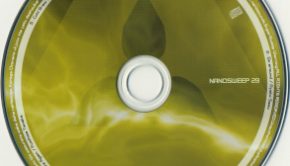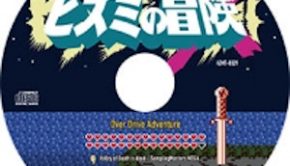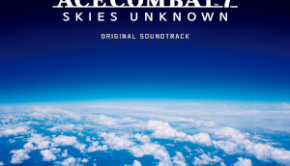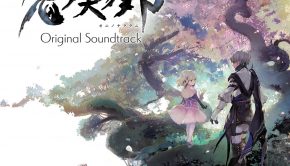R:Racing Evolution Direct Audio
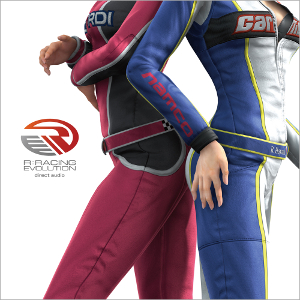 |
Album Title: R:Racing Evolution Direct Audio |
| Record Label: Sweep Record |
|
| Catalog No.: SRIN-1120 |
|
| Release Date: September 19, 2014 |
|
| Purchase: Buy at CD Japan |
Overview
The R: Racing Evolution Direct Audio release by Supersweep contains music for the Ridge Racer spin-off title for the Gamecube, Xbox, and Playstation 2, originally released in 2003. Featuring music by Yuu Miyake, Hiroshi Okubo, Akitaka Tohyama, Satoru Kosaki, and Koji Nakagawa, it provides a fitting sound for the series at the time. However, how does the music hold up on its own and after such a long time since the game’s release?
Body
The album opens and closes with Yuu Miyake’s main vocal theme for the game, “Show the world,” a funky, soulful vocal theme that showcases the styles that are present in the game. The vocals are also well performed and really help add a nice, personal touch to the electronic accompaniment. The full version, presented at the end of the album, is the definitive edition and is a highlight on the album.
While Yuu Miyake’s vocal theme is quite in line with many of the styles on the album, some of his other tunes are bit experimental, especially the two select screen themes. These themes have a very disjointed sound, thanks to the various effects on the melody line that may put some listeners off; however, the accompanying beats are quite nice and feature a nice lounge atmosphere. “Time Compression” also features this same sort of manipulation, although to a more dance-like accompaniment; though some might enjoy the glitch effect, for me it become a bit of a distraction when it disrupts the entire flow of the piece by dropping the accompaniment and solely features this segmented manipulation. Lastly, his “Funk-A-Tronic” piece also begins to irritate thanks to the brass line that dominates much of the entire piece, despite the funky flavor of the bass line.
Hiroshi Okubo’s contributions definitely give me that Ridge Racer feeling, particularly in “Deep Resonance” with its soulful vocal samples and club vibe. It definitely gives off that feeling of driving without being overly energetic. However, his standout contribution for me was “Divas,” with its funk and disco mashup. It has this certain charm that really manages to impress and I love the vocal manipulation in the track. “Carmine” features more of a lounge vibe, although there is some slight jazz influence, thanks to the piano. It isn’t the most standout track, but it is an enjoyable one. Lastly, “Boombox” is another standout on the album. The mix of ethereal vocoder and synth mixed with a really creative beat makes for one excellent tune.
Akitaka Tohyama brings a few styles with his contributions. “Liquid Soul” has an electronic jazz/lounge sound with wispy vocal snippets. Stylistically, the piece reminds me a bit of “4:00pm” by Keiki Kobayashi on Nanosweep 6, but with more energy. “Mars Landing,” on the other hand, features a much heavier sound for the album, but is mixed with a softness in the melody that really helps convey a bit of a space vibe. Lastly, “T Minus Ten,” features a bit of a psytrance influence, although not nearly as pronounced as some of his later works. It’s also more repetitive in nature and doesn’t really standout compared to some of his other contributions, although it does feature a nice energy.
Although he only has one tune, Koji Nakagawa’s “Rising” is another hit that really manages to satisfy. It is very reminiscent, in terms of techniques utilized, to his “Recycle” track from the first Nanosweep and I also really appreciate the vocoder usage in conjunction with the synth manipulation in the track. Lastly, “Monte Carlo,” by Satoru Kosaki, offers an nu jazz soundscape that stands among the highlights on the album, thanks in part to its progression as well as some of the great keyboard sections.
Summary
Like many releases in the Ridge Racer series, the soundtrack itself is a collaborative effort which helps bring a diverse, yet largely cohesive, sound to the mix. However, this soundtrack, while a good listen, doesn’t have too many standout tracks. The styles represented all work well, many of them are fitting for the racing action, but don’t necessarily have a distinct flair to them. In some cases, there are some miscues in terms of instrument choices, but these are just a small complaint. For fans of the Ridge Racer series who have longed for this missing piece of musical history, this album may be for you. However, for fans of more recent Ridge Racer games, this one is cautiously recommended, due to the softer soundscapes presented.
Do you agree with the review and score? Let us know in the comments below!
3.5
Posted on October 15, 2014 by Don Kotowski. Last modified on October 15, 2014.

